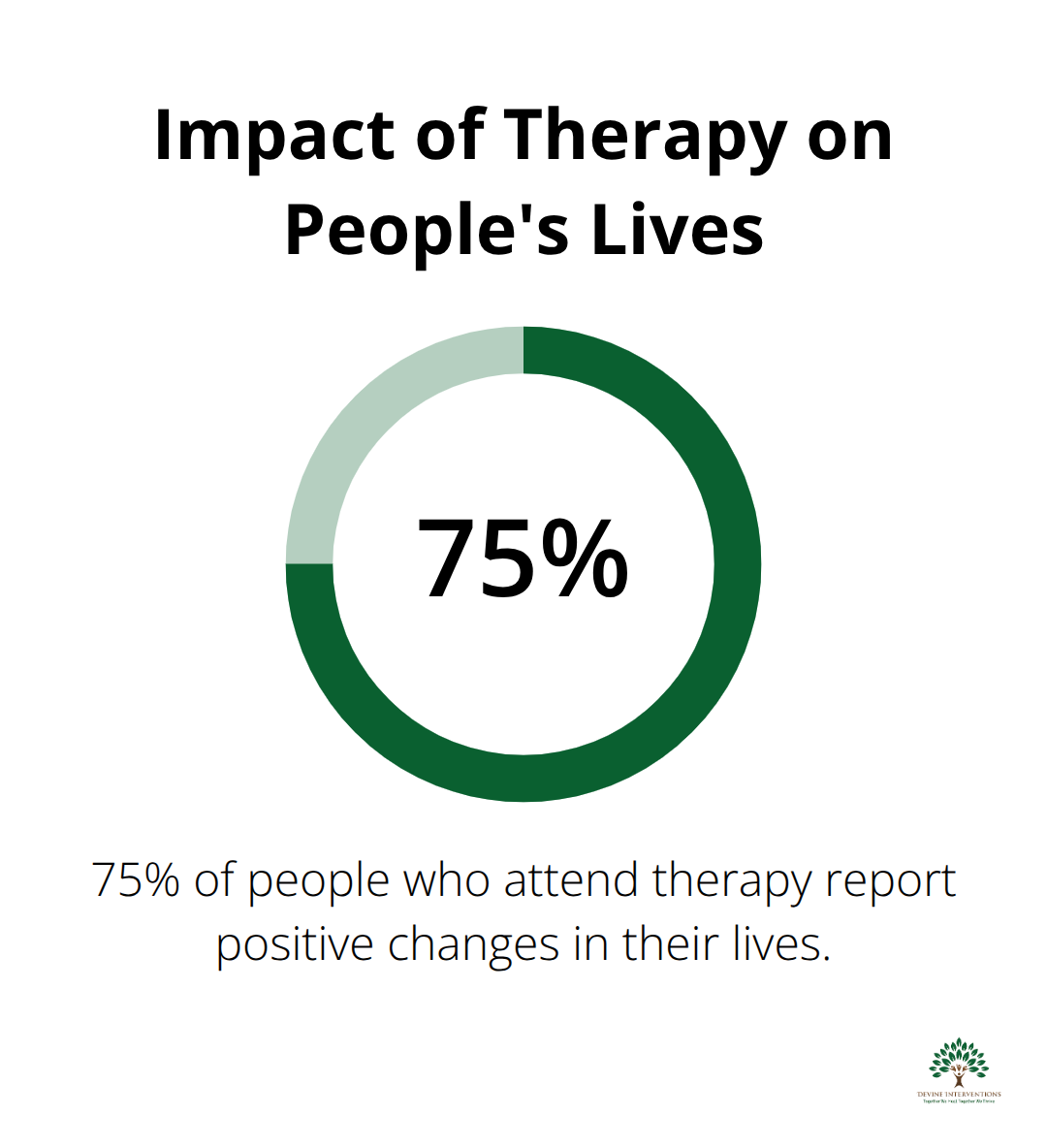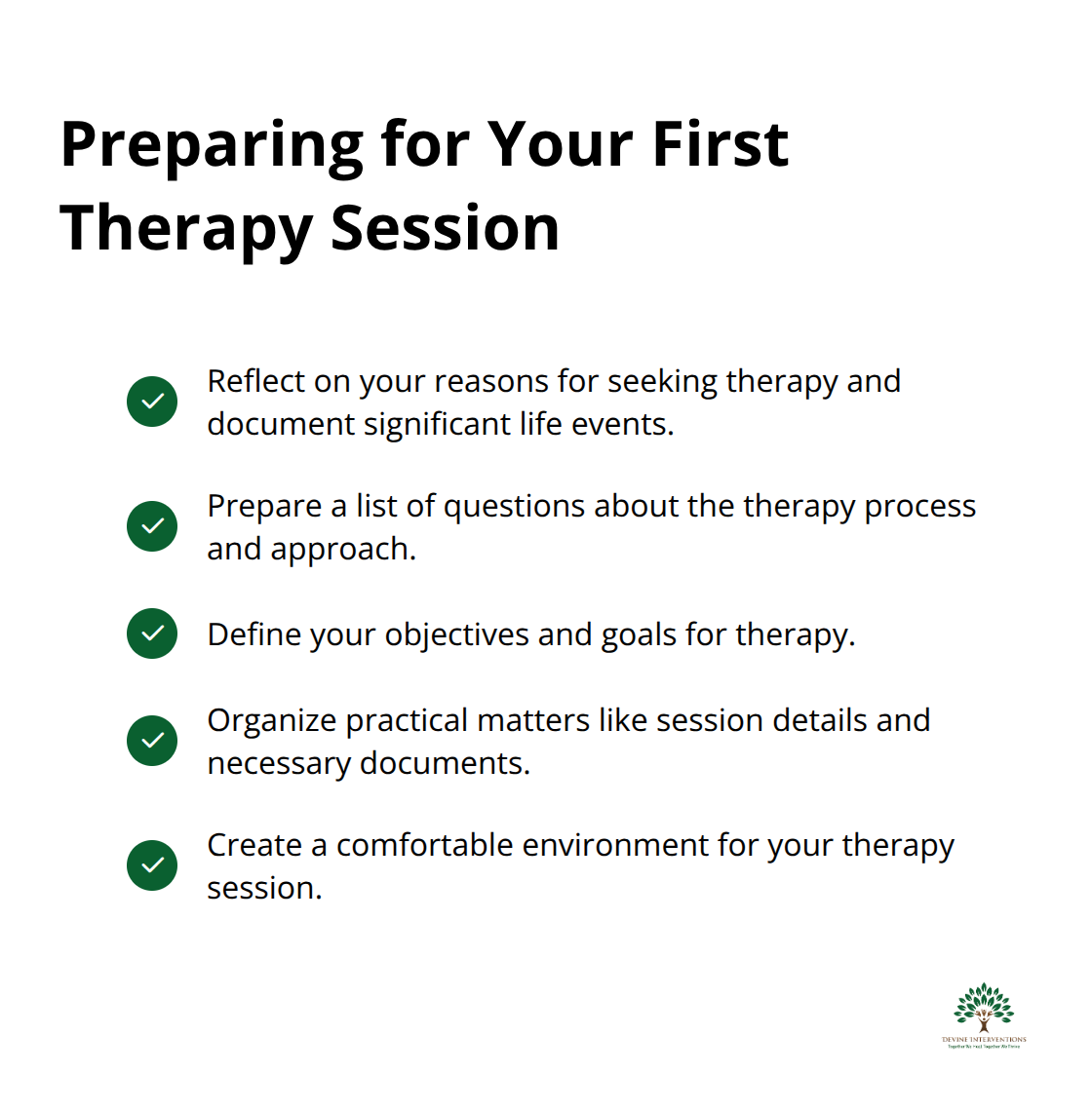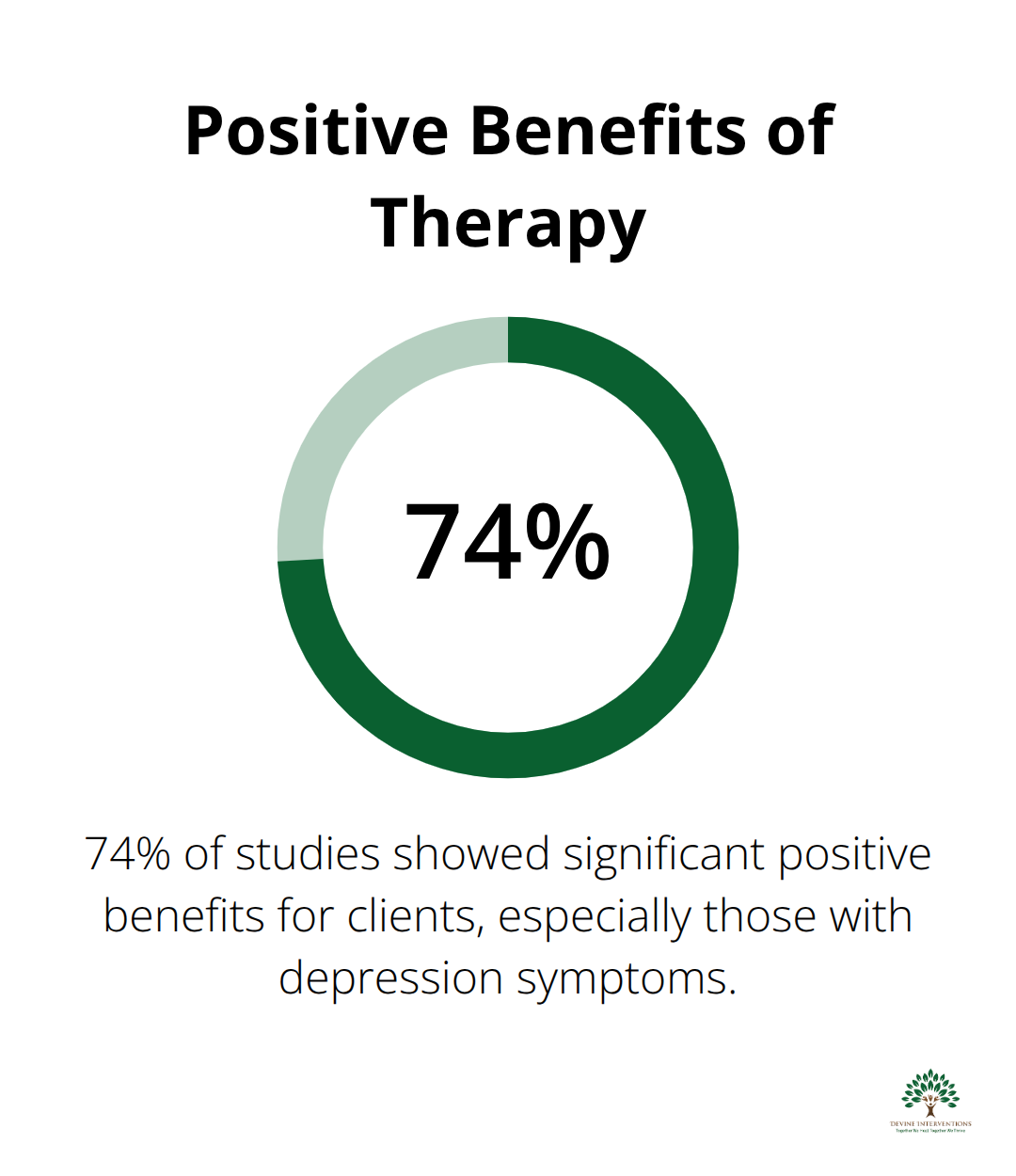Taking the first step towards therapy can be both exciting and nerve-wracking. At Devine Interventions, we understand the mix of emotions you might be feeling as you prepare for your first therapy session.
That’s why we’ve put together these first therapy session tips to help you feel more confident and prepared. By knowing what to expect and how to get ready, you’ll be better equipped to make the most of this important step in your mental health journey.
What Happens in Your First Therapy Session?
Setting the Stage
Your first therapy session marks an important step in your mental health journey. At Devine Interventions, we want you to feel prepared and confident as you start this process.
The initial session primarily focuses on getting to know each other. Your therapist will ask questions about your background, current concerns, and what you hope to achieve through therapy. This isn’t an interrogation – it’s a conversation to help your therapist understand how best to support you.
A 2022 study by the American Psychological Association found that 75% of people who attend therapy report positive changes in their lives. This process starts with your first session.

Building a Therapeutic Relationship
Trust forms the foundation of effective therapy. Your first session provides an opportunity to see if you and your therapist are a good fit. You should feel comfortable asking questions about their approach, experience, and qualifications. Our therapists at Devine Interventions create a welcoming, non-judgmental environment from the very first interaction.
Research consistently shows that a strong, trusting relationship with your therapist is one of the most significant predictors of positive therapeutic results.
Setting Goals
While you won’t solve all your problems in one session, you’ll start to outline your therapy goals. These might include managing anxiety, improving relationships, or developing coping strategies for stress. Your honesty about what you want to achieve helps your therapist tailor their approach to your needs.
A 2021 survey by the National Alliance on Mental Illness revealed that 80% of people who set clear goals in therapy reported feeling more satisfied with their progress. At Devine Interventions, we emphasize collaborative goal-setting to ensure you’re on the right path from day one.
Discussing Treatment Options
Your therapist will explain different treatment approaches (such as Cognitive Behavioral Therapy or Motivational Interviewing) and how they might benefit you. They’ll also discuss the frequency of sessions and any potential homework or exercises to support your progress between appointments.
Addressing Concerns and Questions
The first session is your chance to voice any concerns or questions you have about therapy. Whether you’re worried about confidentiality, the length of treatment, or how to measure progress, your therapist will address these issues openly and honestly.
As you prepare for your first therapy session, try to approach it with an open mind. The mix of emotions you might feel – excitement, nervousness, hope – is completely normal. Embrace these feelings as you take this important step towards better mental health. In our next section, we’ll explore practical ways to prepare for your first session, ensuring you make the most of this valuable opportunity.
How to Get Ready for Your First Therapy Session
At Devine Interventions, we understand that preparation can enhance your initial therapy experience. Here are practical steps to maximize your first appointment.
Reflect and Document
Take time to ponder what brings you to therapy. List significant life events, current stressors, or symptoms you experience. This self-reflection will help you communicate your concerns clearly to your therapist.
Compile a list of your current medications (including dosages). If you’ve attended therapy before, note what worked well and what didn’t. This information provides your therapist with a clearer picture of your history and current situation.
Prepare Your Questions
It’s natural to have questions about therapy, especially for first-timers. Write them down to ensure you don’t forget during your session. Consider asking:
- What’s the frequency of our meetings?
- How do you approach therapy?
- What methods will we use to track progress?
- What are your confidentiality policies?
We encourage open communication from the start (this is a cornerstone of effective therapy).
Define Your Objectives
Think about what you want to achieve through therapy. Do you aim to manage anxiety, improve relationships, or work through a specific issue? Having a general idea of your goals can guide your therapy journey.
A study in the Journal of Counseling Psychology found that clients who set clear goals at the beginning of therapy reported greater satisfaction with their progress. Your objectives may evolve, but a starting point proves incredibly helpful.
Organize Practical Matters
Confirm the session details (date, time, location or online platform). If it’s an in-person session, plan your route and arrive early to avoid stress. For online sessions, test your technology beforehand.
Prepare any necessary documents (insurance information, referral letters, etc.). Having these ready will streamline the administrative process.

Create a Comfortable Environment
If you’re attending a virtual session, choose a quiet, private space where you won’t be interrupted. Ensure good lighting and a stable internet connection. Have a glass of water nearby and perhaps a notebook for jotting down thoughts.
For in-person sessions, wear comfortable clothing and bring anything that might help you feel at ease (a favorite scarf, a stress ball, etc.).
Your therapist at Devine Interventions will work with you to clarify your goals and develop a treatment plan that fits your needs. The most important thing is to approach your first session with an open mind and readiness to engage in the process. In our next section, we’ll explore what typically happens during your first therapy session, helping you feel even more prepared for this important step in your mental health journey.
What Happens in Your First Therapy Session?
Session Structure
Your initial session at Devine Interventions typically lasts 50-60 minutes. We start with a brief introduction and explain our confidentiality policies. Then, we explore your reasons for seeking therapy and your current concerns.
A recent review found that 74% of studies showed significant positive benefits for clients, especially those with depression symptoms. This improvement often starts with the first appointment.

Common Questions from Your Therapist
Your therapist will ask about your current situation, symptoms, and relevant history. They might inquire about your family background, relationships, work, and any previous therapy experiences.
Prepare for questions such as:
- What brings you to therapy now?
- How long have you experienced these issues?
- What are your goals for therapy?
There are no right or wrong answers. Your honesty helps us tailor our approach to your needs.
Building a Therapeutic Relationship
The first session establishes rapport. Your therapist will explain their approach and treatment methods. We encourage you to ask questions about their experience or qualifications.
We prioritize creating a safe, non-judgmental space from the very first interaction. We understand that opening up can challenge you, and we support you every step of the way.
Setting the Stage for Future Sessions
Your therapist will outline what to expect in future sessions. They might suggest a treatment plan or discuss the frequency of your meetings. This gives you a roadmap for your therapy journey.
Try to share any concerns or preferences you have about therapy (e.g., specific techniques you’d like to try or avoid). Your input shapes your treatment experience.
Addressing Practical Matters
We’ll cover practical aspects of therapy, such as scheduling, payment options, and our cancellation policy. This ensures a smooth process for future sessions.
Your therapist will also explain how to contact them between sessions if needed. This information helps you feel supported throughout your therapy journey.
Our program balances individual counseling with group therapy sessions. In one-on-one sessions, you work through personal challenges with a dedicated therapist.
Final Thoughts
Your first therapy session marks a significant step towards improved mental health. Our first therapy session tips will help you prepare effectively and set realistic expectations. You’ll start to build a trusting relationship with your therapist, which forms the foundation for successful treatment.
Honesty about your concerns, goals, and questions will enable your therapist to tailor treatment to your unique needs. Many people experience improved emotional well-being, better coping skills, and enhanced relationships after engaging in therapy. Your decision to seek help demonstrates strength and a commitment to personal growth.
We at Devine Interventions offer comprehensive, compassionate care for individuals of all ages. Our services range from individual therapy to intensive outpatient programs (ensuring we meet your specific needs). We’re ready to support you throughout your journey towards better mental health, starting with your first therapy session.







